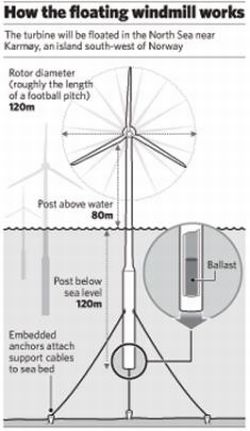 When the world is getting serious with its global warming and greenhouse gas emissions issues, more and more energy producers are shifting to alternative or renewal resources to produce power.
When the world is getting serious with its global warming and greenhouse gas emissions issues, more and more energy producers are shifting to alternative or renewal resources to produce power.
But, it does not seem sufficient to just resort to alternative energy to stay in the ‘competitive paradigm shifting.’ To berge ahead, the companies are pushing hard to create something different, atleast enough to make a headline.
Perhaps, cuing with these lines, the German engineering giant Siemens has planned to build a wind farm. True, wind farms are no more a new concept, but they are planning to erect the ‘world’s first floating wind turbine!’
Alexandra Bech Gjoerv, the head of the energy division at Norsk Hydro — the Norwegian firm spearheading the project – said,
It’s attractive to have windmills out at sea. We can produce a lot of energy, out of sight.
Explaining the advantage of having a floating wind turbine, Walt Patterson, an energy expert at the Chatham House think-tank in London, said,
It’s a logical step. Floating turbines will be easier to make because you can do most of the fabrication on land and then float it out to sea.
But, the questing of keeping the turbines secure in the North Sea, where waves can reach 30m in height, arises. To face the waves, three cables will be loosely anchoring the base of the turbines to the seabed, a technology similar to that used for offshore oil platforms. But, this is with much greener credentials.
The prototype is initially expected to generate about five megawatts of electricity, which can supply at least 1,000 homes. And once successful, a small offshore windpark could be built by 2014, which would consist of about 200 turbines.
The floating wind turbine is expected to be up and running in under two years. Hope this would help environmental campaigners chill down with their claims that turbines are an eyesore for tourists – endangering the tourism industry.
Thus, the region’s coastal cities, keep your fingers crossed and dare dream a ‘green’ future, which would help you from dependency on fossil fuels.
Image




